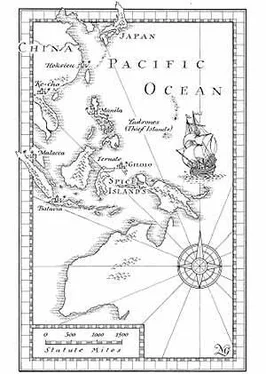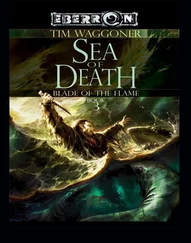TIM SEVERIN

PIRATE
PART THREE
SEA ROBBER
PAN BOOKS


ONE

IT WAS NUMBINGLY HOT, even in the shadow of the fort. Hector Lynch felt his shirt sticking to his back despite the afternoon sea breeze, which stirred the shrivelled tips of the fronds of palm thatch over his head. From where he sat he had a fine view of the anchorage. The lean-to was built against the fort’s seaward wall, and the wind carried the sound of the surf. There was a constant rumble as waves crested and broke on the long expanse of dirty yellow beach. At a distance the regular lines of crashing foam were hypnotically beautiful. Their brilliant whiteness contrasted with the translucent jade-green of the sea behind them. But, up close, he knew from experience that the surf was a menace. The advancing walls of water churned and tumbled and threatened to overturn any small boat that risked a landing. That was why the five ships waiting to take on cargo stayed moored half a mile out to sea. They were secured safely in ten fathoms of water, anchors firmly lodged in good holding ground. Yesterday a longboat had attempted a landing through the surf and been thrown upside down. A man had drowned, his corpse eventually pulled from the water by one of the local fishermen whose canoes were better able to deal with the breakers.
Hector looked down at the ledger book open on the rough plank table before him. It was hard to concentrate in the stifling heat. ‘Cutlasses, carbines, musketoons, amber beads, crystal beads, rough coral, small shells called cowries,’ he read. These were what the slave dealers expected. This was the Guinea coast, and the Carlsborg , which had brought him and his three friends to West Africa, was waiting with the other ships to complete her human lading. Her supercargo, who normally kept the accounts, had died of breakbone fever the previous week, and Hector had been charged with drawing up an inventory of goods remaining for barter.
A movement out to sea caught his attention. A launch was putting out from one of the anchored ships and heading towards the beach. Either the oarsmen were very confident or the surf had abated a little. He watched the boat approach the area where the waves began to heap up, and there it paused. He could see the coxswain standing in the stern, scanning the backs of the waves, waiting for the right moment. Hector thought he heard a shouted command, almost lost beneath the roar of the surf. A moment later the rowers were digging their blades into the water, urging their boat forward to catch the sloping back of a wave. Then they rowed flat out, riding just behind the crest as it rolled towards the beach. The final twenty yards were covered in a frothing welter of foam. The launch, still on even keel, was cast surging up the beach. Two men leaped out and grabbed hold of the gunwale to prevent their boat being sucked away in the backwash. A small crowd of natives came running to help manhandle her farther up the beach.
The beaching had been neatly done. The half-dozen men who had landed began walking across the sand, heading towards the fort.
Hector turned back to his ledger. What on earth, he wondered, were the ‘perputtianes and sayes, and paintradoes’? Maybe these were Danish words. The supercargo had written his other entries in English, though both the Carlsborg and the fort belonged to Det Vestindisk-Guineiske Kompagni, the Danish West India-Guinea Company. Perhaps someone in the fort would be able to translate.
An eddy of the breeze along the foot of the fortress wall brought a whiff of some foul smell. It was the stench of stale sweat and human waste combined with the sickly-sweet odour of rotting fruit. It came from iron grilles set low in the wall, almost at the level of the sandy ground. Behind the metal bars lay the ‘storerooms’, as the dour Danish commandant called them. Hector tried not to think about the misery being suffered by the inmates crammed in the heat and semi-darkness, awaiting their fate. Hector, still barely into his twenties, had himself spent time as a slave in North Africa. Kidnapped from his Irish village by Barbary corsairs, he had been sold in the slave market of Algiers. But he’d never been exposed to such vile conditions. His owner, a Turkish sea captain, had valued his purchase and treated Hector generously. Hector shifted uncomfortably on his bench at the memory. To please his master, he’d agreed to convert to Islam and be circumcised. He had since abandoned all religious faith, but he still recalled the shocking pain of the circumcision.
The memory of Algiers made him look across at his friend, Dan. They’d first met in the slave barracks of Barbary and eventually gained their freedom. Dan was seated across the table, his mahogany-coloured face bent over a sheet of parchment as he concentrated on drawing a picture. He had tied his long black hair in a queue so it would not interfere with his pen and coloured inks. Dan did not appear much affected by the heat. He was a Miskito Indian from the Caribbean coast, where the summers could be almost as hot and humid.
‘What’s that you’re drawing?’ Hector asked.
‘A bug,’ answered Dan. He lifted an upturned wooden bowl on the table by his elbow, and Hector had a glimpse of a huge beetle. It was the size of his fist, its shell a vivid yellow-orange with black stripes. ‘I’ve never seen anything like it before,’ Dan said. ‘In the jungle back at home we have plenty of bright shiny beetles, but nothing nearly as big, or quite this colour.’ He clapped the cup back over his captive before the insect could escape.
‘I hope the captain is quick in filling his quota,’ observed Hector.
‘Let’s hope there’s a war upcountry. That’ll bring plenty of prisoners for sale,’ observed Dan bleakly. A week ago the Carlsborg ’s commander had set off inland with a party of sailors. He intended to buy his human cargo directly from the local chiefs, because the stock of slaves held in the fort had already been promised to other ships.
Hector found Dan’s remark callous until he remembered that the Miskito themselves were notorious slavers. They raided the neighbouring tribes and took men, women and children.
He was about to change the subject when a mocking voice behind him drawled, ‘If it isn’t young Lynch, and poring over a book as usual.’
Hector turned in his seat and looked into the cynical gaze of a man of middle age who, despite the heat, was wearing a smart coat of bottle-green serge with a lace jabot tied at his neck. It took Hector a moment to recognize his former shipmate John Cook, whom he’d last seen off the coast of South America on the buccaneering raid that had nearly led to Hector’s execution. Judging by the motley collection of rough-looking seamen behind him, Cook still kept the same raffish company.
‘Still with your Indian friend, I see,’ drawled Cook. Hector remembered him as ruthless, yet astute, quick to seize an opportunity or to save his own skin. He and a number of the other buccaneers had deserted the South American expedition when they judged the risks of being caught and executed by the Spanish colonists were getting too great.
‘How did you manage to escape the thief-takers in London? I’d heard you were on the wanted list,’ said Cook. He treated Hector to a twisted smile.
Читать дальше











